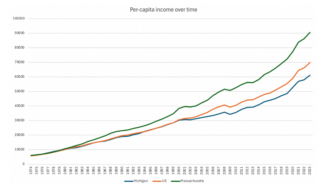
Our goal is rising income for all: creating a Michigan economy that as it grows benefits all. Where the measure of economic success is household income based, rather than unemployment and economic growth rate based. Our work is focused on getting a data-driven, big-change economic well-being state policy agenda enacted in a purple state. Where the development and promotion of the agenda is done by cross-sector, cross-ideology individuals and organizations with clout. Starting with the Michigan Future Board.
Keeping with the same lean staffing model that has defined our work for the past three decades, we focus our effort and leadership on informing and mobilizing a diverse set of partners to create and move a rising income for all policy agenda. This work is a multi-year endeavor.
Origins
For more than three decades Michigan Future, Inc has been a voice of forward-looking action, based in data and focused on returning Michigan to a high-prosperity state. Our aim is rising income for all, with an economy where all Michigan workers have income and benefits that allow them to pay the bills and save for retirement and their children’s education.
Too many Michigan communities and households are struggling. Yet our public and political
discourse continues to focus on the wrong issues, clinging to the impossible idea of making
the old economy work again. MFI is working to bring our research and recommendations to a
larger population of community leaders and reframe the public conversation so that our
public policy will improve the economic well-being of all Michigan families.
Michigan politics have changed in the thirty three years since the inception of MFI. Political leadership has become more and more entrenched in ideological issues that ignore the economic realities of most Michigan families. There is a notable absence of pragmatic legislative agendas that are capable of impact at scale across geography, race and class.
How do you activate political change to shift the economic trajectory of Michigan? This is the
question at the core of the work of Michigan Future. Our focus is to ignite transformative redesign of Michigan’s economy with a high-impact agenda for all Michigan households. We work at the system level for broad scale, sustainable solutions. We work on the hard things with an unshakable belief that we can bend the curve and construct an economy that works for everyone. Our question is not “Is it possible?”, but rather, “What will it take?”
We remain committed to work with the singular focus of increasing prosperity for all Michigan
households and build coalitions of influential people with something to contribute that
result.
Agenda
Why are so many Michigan households struggling? There are three big challenges:1) Too many
low-paid jobs; 2) Too few with the education to get a good-paying job and career; and 3) Too
low talent concentrations to retain, attract and grow high-wage employers.
Our Rising Income for All agenda addresses these challenges through four high-Impact policy levers:
- Make rising income for all the primary mission of state economic policy.
- Increase income for low-wage workers through an expanded, cash-based safety net plus health coverage for all.
- Prepare all Michigan children for high-paid forty-year careers by making the 6C’s the foundational skills for all students from birth through college.
- Increase talent concentrations and attract high-paid jobs by creating places where talent want to live and work.
The Action Plan
The quality of our research and the caliber of our bipartisan board gives MFI a unique ability
to bring leaders together across ideological and geographic divides and across sectors for in-depth conversations on how to deal with the economic challenges Michigan households are facing and will face tomorrow.
This is how our agenda was developed, co-owned and embraced by so many leaders. The interest is strong and encouragingly statewide, bi-partisan and across sectors.
We have learned that co-ownership requires a chance to work over time and in-depth with a
diverse set of leaders. Convening deep-dive activities builds on our ability to engage
economic and community leaders and policy makers around the need for an income-based economic policy.
Our role is to power the passage of the agenda by convening politically-influential thought
leaders from all areas of the state and diverse political ideologies willing to dig in as co-owners
of the agenda and exert their personal and professional capital to frame the detail, design the roadmap to legislative enactment and ultimately directly advocate for its passage.
Our approach to policy development and implementation coupled with our organizational
design is intentionally structured to give us the best chance in a purple state of catalyzing a rising income for all agenda and creating a Michigan economy that as it grows benefits all.
Progress
- Earned Income Tax Credit: Here the progress has been transformative. Not only were we the catalyst for getting the largest expansion of the EITC introduced, but we led the organization of an unprecedented huge cross-sector, cross-ideology coalition in support of the legislation. In large part, it was that coalition that was successful in getting a historic expansion of the credit enacted.
Expanding the state’s EITC fivefold––from a six to thirty percent match of the federal credit––puts an estimated four hundred million dollars in the wallets of around 625,000 lower-wage working households year after year after year.
At the core, our strategy is centered around organizing broad cross-ideology, cross-sector support. The lobbying/advocacy comes from the members of the coalition. The EITC experience confirmed for us that our purple state strategy was the right approach to actually enacting––as opposed to just proposing––a rising income for all state policy agenda.
- The Working Parents Tax Cut: Following enactment of the EITC expansion, the Michigan Future Board recommended as the next step to building a cash-based safety net enactment of a Working Parents Tax Cut (WPTC). It is designed to deal at scale with child care affordability challenges and the so-called benefits cliff. The credit would provide EITC recipient households an annual refundable credit of $5,000 for each child up to the age of three and an annual $2,500 refundable credit for each child from three up to the age of six. It is estimated to provide around 250,000 lower-wage working households with a nearly one billion dollars annual increase in income.
We have organized a broad inaugural cross-sector, cross-ideology support coalition which will lead the advocacy efforts on the WPTC. And we have conducted a statewide poll on the proposal which demonstrated overwhelmingly public support for the proposal and the general concept of helping parents with income rather than programs.
- Michigan Talent Partnership: Our recommendation for central city neighborhood talent concentration funding was included in the Fiscal Year 2024 budget as a five million dollars pilot program for the cities of Detroit, Grand Rapids and Lansing. And was expanded to a statewide $25 million competitive grant program in the Fiscal Year 2025 budget.
The initiative is a central component of our focus on rising income for all as it is designed to grow high-wage Michigan jobs. Michigan’s core economic challenge is that we are now a low-wage state with six in ten Michigan jobs paying less that what is required to be a middle class household of three. High-wage jobs are increasingly concentrated in knowledge-based industries. And the asset that matters most to knowledge-based employers is college-educated talent, particularly young professionals.
This is an economy where talent attracts capital. And quality of place attracts talent. High-prosperity states and regions are characterized by both high concentrations of knowledge economy employers and high concentrations of adults with a B.A. or more. And that requires transit-rich vibrant central cities because that is where many recent mobile college graduates are choosing to live after graduation. The Michigan Talent Partnership is designed to make public investments in central city public spaces to create Michigan neighborhoods that are national talent magnets.
- Research and communications: The core of MFI’s work continues to be cutting-edge research on the Michigan economy and labor market. With a particular focus on the economic well-being of Michigan households.
We rereleased our 2004 A New Path to Prosperity? report which predicted that if Michigan did not become more knowledge economy concentrated and a place where young talent chose to live after college that we would become poorer compared to the nation. That is exactly what happened: Michigan has declined from 16th in per capital income in 1999 to 39th in 2022.
The 2024 report update received extensive media coverage. And led to the opportunity to present our findings and policy recommendations to the Growing Michigan Together Council, the Senate LEO appropriations subcommittee and the Senate Economic and Community Development Committee.
Curent Work
Our strategy to continue work on our rising income for all policy agenda over the next several years is rooted in three general principles:
- Use two-tier labor market analysis to change the economic mission and economic and education policy of the state;
- Recruit cross-sector, cross ideology champions to create the specifics of a rising income for all policy agenda and advocate for its passage; and
- Assemble and support coalitions of highly-influential policy leaders in key sectors and
geographies to increase the likelihood of passage in a purple state.
Our work will concentrate on:
- Continuing our cutting-edge research on the Michigan economy and labor market
- Enacting a Working ParentsTax Credit.
- Implementation of the Michigan Talent Partnership and making it an ongoing program
- Developing specific education policy recommendations. Designed to create an education system that prepares all students for a good-paying forty-year career. Which means making sure all students (1) learn about all good-paying career opportunities, (2) develop rigorous generalists/6Cs/rock climbing foundation skills and (3) leave high school prepared for B.A. completion (if they choose that path).
- Changing the narrative about the Michigan economy and labor market. Our biggest challenge to implementing a big-change rising income for all policy agenda is by and large––on a bi-partisan basis and across sectors––those with clout do not share our analysis of and vision for the Michigan economy and labor market: the need to transition to a knowledge-based economy and to prepare, retain and attract talent as economic development priority one.
Our belief is that Michigan has gone from a high- to a low-prosperity state due in large part to choices Michigan has made to not adjust to new realities. That the decline is due in large part to trying to make an old economy that made us prosperous in the past, but no longer exists, work again. That old economy vision and strategy will insure that Michigan remains a low-prosperity state with a high proportion of households––and an even higher proportion of Black and Brown households––struggling to pay for necessities.
Figuring out how you build a shared vision and strategy based on new realities is probably the most important work we need to do going forward.







